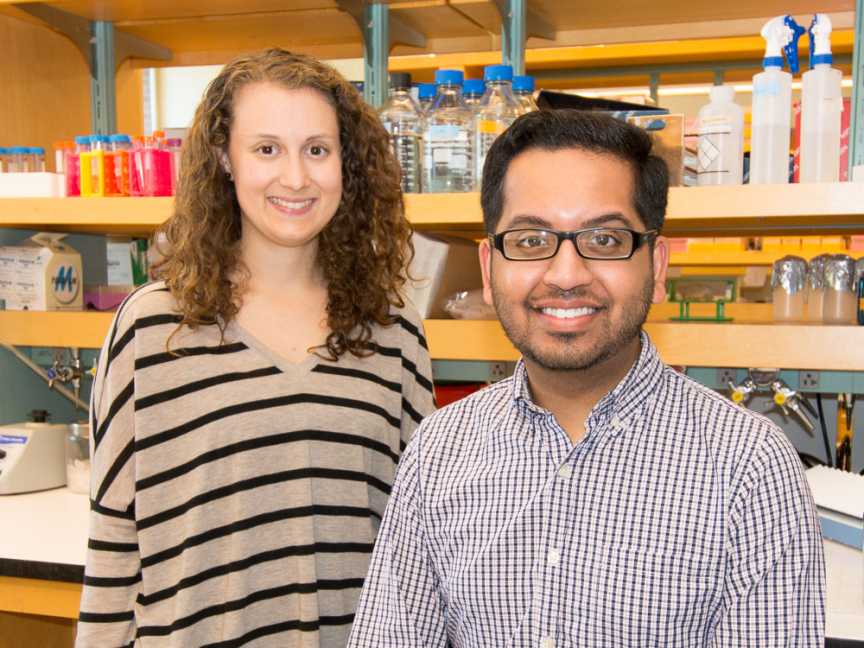National Institutes of Health Extends Life Span of Prestigious Rutgers Biotechnology Training Program
Program broadens doctoral students' education to include technology development and experience in industry
At a time when federal funding is getting harder to secure, the National Institutes of Health (NIH) has renewed its funding for a prestigious Rutgers biotechnology training program. The nearly $2 million grant funds the program for another five years.

The NIH created its Biotechnology Predoctoral Training Program in 1988 to broaden doctoral students’ exposure beyond the narrow focus of their dissertation work and add technology development and industrial experience to their educations.
Rutgers was among the first nine universities to receive funding, and has held onto that funding continuously for the past 25 years.
“Securing funding for training programs has become a real struggle in recent years, so this latest renewal affirms the depth and breadth of our offerings and the quality of our students and faculty,” said Martin Yarmush, Paul and Mary Monroe Chair and Distinguished Professor of Biomedical Engineering, founder and co-director of the Rutgers Ph.D. Training Program in Biotechnology.
The program hosts 15 students annually, providing two years of financial support before the students need to secure funding through faculty grants or other research fellowships. It draws students and faculty from biomedical engineering, chemical and biochemical engineering, chemistry and chemical biology, and 10 life science graduate programs.
The program also offers its own courses and seminars in advanced biotechnology, industry topics, and innovation and entrepreneurship, led by experts from Rutgers and area companies.

With a 25-year track record, it’s not surprising that many alumni now hold leadership positions in academia and industry.
One of the program’s first students, David Odde (pronounced “oh-dee”) is now a biomedical engineering professor at the University of Minnesota. One reason the Rutgers program was so successful, he recalls, is because New Jersey’s pharmaceutical and biotechnology companies liberally shared their resources and expertise with the university.
“I’d like the Twin Cities to be stronger in the kind of biotechnology that exists in New Jersey,” said Odde. “That’s something I’m working toward here. The biotechnology program at Rutgers inspired me in that direction, and it still does to this day.”
Ramona Lloyd went into the pharmaceutical industry after completing her doctoral work in molecular virology in 1992. She held vice presidential positions in regulatory affairs at Bristol Myers Squibb and ImClone systems and co-founded a start-up pharmaceutical company. She now guides entrepreneurs who are starting up biotechnology companies.
“There’s a distinct value in having a breadth of knowledge,” said Lloyd of her training at Rutgers. “Being able to think about and know about more than molecular virology helped me accelerate more rapidly on the career ladder.”
Ken Valenzano benefitted from the program’s requirement that students spend several months working in pharmaceutical or biotech companies. Now a senior vice president at Amicus Therapeutics in Cranbury, Valenzano worked with a Swedish company developing insulin-like growth factors while at Rutgers during the fall of 1993. He returned for a second stint the following year.
“The pace at which their research advanced over those six or nine months was unbelievable to me,” he said. “It became clear that that’s where I wanted my career to go.”
Today’s students continue to embrace the opportunities that alumni valued.
Kathryn Drzewiecki, a fifth-year doctoral student in biomedical engineering, likes the way she can interact with students in different majors; while Dharm Patel, a fourth-year doctoral student in molecular biology and biochemistry, says the program has given him scientific knowledge of how drugs work and an understanding of their market feasibility.

“My career aspirations are to bridge the gaps between physicians in the clinic and pharmaceutical companies doing research and development,” Patel said.
Co-directing the program with Yarmush is Ann Stock, interim director of the Center for Advanced Biotechnology and Medicine (CABM). Her predecessor, the late Aaron Shatkin, founded the program with Yarmush.
“This program foreshadowed the benefits of integration between the medical school and Rutgers,” said Stock, a professor of biochemistry and molecular biology at Robert Wood Johnson Medical School. “We have a cohesive group of faculty that is highly engaged, and the students are a close-knit group.” She also notes that the NIH is examining the success of Rutgers’ program to guide its future support for biotechnology training.
Media contact: Carl Blesch, 848-932-0550, cblesch@ucm.rutgers.edu